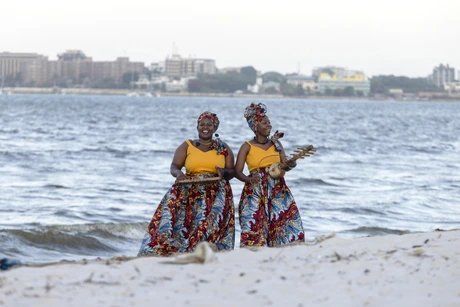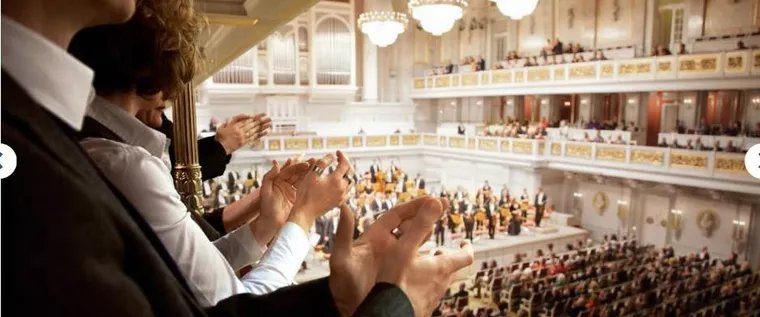
With its project WAGOGO DRUMS: TANSANIA, lautten compagney BERLIN explores the possibilities of music beyond the colonial canon, which continues unquestioned in blanket terms such as “African music.”
The techniques of so-called “early music” from Europe show parallels to West African playing practices, which can be seen in techniques such as ostinato/riff, call and response, and hoketus/interlocking. The project explores common sources and differences in a week-long workshop and two concerts at the Humboldt Forum. The focus is on two musical traditions: the music of the Wagogo people from Dodoma, Tanzania, with their advanced vocal and percussion culture, meets dances from the European Renaissance, especially from those countries that were colonial powers in what is now Tanzania (Portugal, Great Britain, and Germany).
Among the musicians who keep the rich heritage of WAGOGO alive is the famous Zawose family. Hukwe Zawose (1940-2003) was Tanzania's most important traditional musician of the 20th century and the founding father of an entire musical dynasty. His daughter Pendo and granddaughter Leah perform internationally as THE ZAWOSE QUEENS, cultivating the elaborate polyrhythmic overtone singing as well as playing the ilimba (lamellophone) and ngoma drums. In another, no less exciting way, Hukwe's son SINAUBI ZAWOSE, born in 1995, is also continuing the family traditions. He is a master of the zeze, a fourteen-stringed bowl lute, and transforms the traditional music of his culture into the present. He is accompanied by LUCAS UBI ZAWOSE (ilimba, chilimba, chizeze) and BAHATI ZAWOSE (percussion).
What does it sound like when a Wagogo lute enters into conversation with a 16th-century European theorbo (bowed lute)? And how can the polyrhythmic dances of the Wagogo be fused with Renaissance dances? Such sound experiments can be expected at this edition of MUSICAL BELONGINGS at the Humboldt Forum.
- The Zawose Queens, Pendo Zawose – overtone singing, ilimba (lamellophone), ngoma drums
- The Zawose Queens, Leah Zawose – overtone singing, ilimba (lamellophone), ngoma drums
- Sinaubi Zawose – zeze (bowed lyre)
- Lucas Ubi Zawose – Ilimba (lamellophone), chilimba, chizeze
- Bahati Zawose – Percussion
There is spirit and fire in the music of The Zawose Queens. There's the vibrations of the ancestors, coming through on traditional instruments — soaring chizeze fiddle, buzzing illimba thumb piano, ngoma drums that chatter and thunder — and voices that go deep, high and out there. There's the connection to nature, to ceremony and ritual, in their dance-inspired fusion, their blend of the organic, harmonic and modern-day electronic. There are lyrics that tell, in their native kigogo, of the passion for music, the wonders of life. Of pride in environment, in tradition. In their East African roots.
Pendo and Leah Zawose showcase the fluid polyrhythms and rapturous polyphonic singing of the Gogo (aka Wagogo) people of the arid, hilly Dodoma region of central Tanzania.
The most famous exponent of this musical tradition is the late, great Dr Hukwe Zawose (Pendo’s father and Leah’s grandfather).
Maisha, the debut album by The Zawose Queens, marks the first time that women from this famous musical family take their place as lead vocalists and performers. Emboldened by workshops in songwriting and music production with visiting UK-based producers Oli Barton-Wood (Jordan Rakei, Obongjayar, Nilufer Yanya) and Tom Excell (Nubiyan Twist, Onipa), The Zawose Queens began writing their first ever songs. The resulting collection of songs range from the stripped back and traditional-sounding to those treated with subtle electronic elements, with beats and drops and found sounds and switch-ups.
Sinaubi Zawose was born on the 01.02.1995 in a musical dynasty of the Zawose family representing Tanzania through Gogo traditional music all over the world.
Sinaubi started learning music as a traditional dancer and drum player at the age of 10 under the supervision of the internationally renown Dr. Hukwe Zawose, a prominent Tanzanian musician of the Wagogo ethnic group.
Sinaubi’s master tutor Hukwe Zawose came to national and international attention after Julius Nyerere invited him to live and work in Dar es Salaam. He gained attention for his work with Peter Gabriel. In 2005 posthumously he was given the Tanzania Hall of Fame Award.
In 2008 Sinaubi Zawose released his first album WICHIMAJE with traditional music based on the nature and language of Gogo traditions. Together with his sisters and brothers he created unique album conserving the musical roots of the Zawose family.
In 2014 he started studies at the TaSuBa art college in Bagamoyo. In 2019 he made appearance on East Africa Got Talent show in Nairobi/Kenya reaching semi-final. Sinaubi made history as first artist from Tanzania to perform traditional 14-string Gogo harp called Zeze live on stage and reaching among TOP TEN out of 5000 contenders.
In 2021 Sinaubi performed at Pamoja Zanzibar Festival at Nafasi Art in Dar es Salaam, touring Zanzibar and Tanzania starting collaboration with Radek Bond Bednarz, musician and producer, founder of Pamoja Zanzibar cultural platform. In 2023 they released “GOGO HIP” album recorded with full live band at Wanene Studios in Dar Es Salaam. It was recognized as one of the best albums of 2023 by World Music Charts Europe.
Bahati Julius Zawose, born on July 15, 1989, in Bagamoyo, Pwani Region, Tanzania, is a talented multi-percussionist, music producer, and vocalist. He hails from the renowned Zawose musical lineage as the grandson of the legendary Dr. Hukwe Zawose and son of Julius Hukwe Zawose.
Deeply rooted in traditional Gogo music, Bahati carries forward his family's musical legacy while infusing it with contemporary sounds. As a core member of the SinaUbi Zawose band, he has made significant contributions to the development and global appreciation of Tanzanian traditional fusion music. Bahati has performed at major festivals across East and West Africa as well Japan, and Europe.
In 2022, along Sinaubi Zawose and Lucas Ubi Zawose Bahati performed at Pamoja Zanzibar Festival, which marked beginning of collaboration with polish musicians and producer Radek Bond Bednarz, founder of Pamoja Zanzibar platform in East Africa. Together they have performed at the Indian Ocean Music Market (IOMMA) in Réunion Island, Music in Africa Access Festival and Conference in Dar es Salaam and Visa for Music in Morocco. Bahati contributed to the recording of "GOGO HIP" album by Sinaubi Zawose & Pamoja Zanzibar at Wanene Studios in Dar es Salaam. The release produced by Bond has been recognized by World Music Charts Europe as one of the best albums of 2023 and presented at European festivals such as Afrika Hertme 2024 in The Netherlands and festivals in Austria, Poland and Hungary.
Lucas Ubi Zawose: Master Musician of Gogo traditional music from Wagogo tribe in Dodoma. Singer, performer and instrument builder. Lucas plays all Gogo traditional instruments like zeze, marimba, ilimba, filimbi, kayamba, chizeze, ndono.. .
Lucas Zawose learned music from his brother Dr Hukwe Ubi Zawose. Together they were touring around the world, sharing the Wagogo tribe music culture and values around the world, in Japan, Germany, United Kingdom, many African countries and more.
Lucas Ubi Zawose is playing music since 40 years but after Hukwe Zawose died in 2003 and Charles Zawose passing away in 2004, Lucas decided to retire. In 2023 he returned to music, recording and performing with Sinaubi Zawose & Pamoja Zanzibar. His onstage presence is always a very special moment for everyone, the band and their audience.
- EUR 20.00 / EUR 10.00 reduced (tickets follow)
- Duration: 90 min
- Hall 2
- No language skills required
- Belongs to: Musical Belongings
Additional information
Accessibility
The Humboldt Forum and all exhibition rooms can be reached barrier-free with a wheelchair. A tactile floor guidance system facilitates orientation for blind and visually impaired visitors. Educational formats are tailored to the different needs of visitors with disabilities. These include tactile tours, guided tours and workshops.
Barrier-free parking is available south of the Humboldt Forum on Schlossplatz. Barrier-free parking is available south of the Humboldt Forum on Schlossplatz. For more information, click here.
By underground and suburban railway
U Museumsinsel (U5): 1 min walk
S/U Alexanderplatz: 15 min walk
S Hackescher Markt: 10 min walk
By bus
Lustgarten: 100, 300, N5; 1 min walk
Berlin Palace: 147; 1 min walk
BVG Fahrinfo
Bus bays are available in Rathausstraße: Stopping time from 9 - 22.30
Barrier-free parking is available south of the Humboldt Forum on Schlossplatz. Barrier-free parking is available south of the Humboldt Forum on Schlossplatz. For more information, click here.
By underground and suburban railway
U Museumsinsel (U5): 1 min walk
S/U Alexanderplatz: 15 min walk
S Hackescher Markt: 10 min walk
By bus
Lustgarten: 100, 300, N5; 1 min walk
Berlin Palace: 147; 1 min walk
BVG Fahrinfo
Bus bays are available in Rathausstraße: Stopping time from 9 - 22.30
Dates
November 2025
| Mo | Tu | We | Th | Fr | Sa | Su |
|---|---|---|---|---|---|---|
1
|
2
| |||||
3
|
4
|
5
|
6
|
7
|
8
|
9
|
10
|
11
|
12
|
13
|
14
|
15
|
16
|
17
|
18
|
19
|
20
|
21
|
22
|
23
|
24
|
25
|
26
|
27
|
28
|
29
|
30
|



